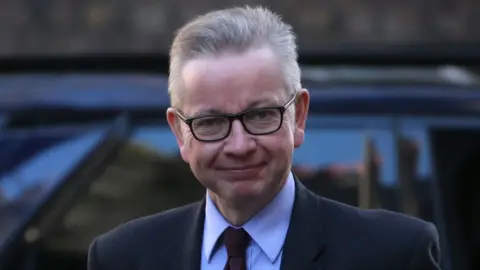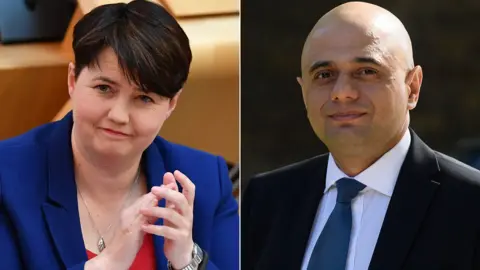Tory leadership contest: Michael Gove 'would scrap VAT'
 ISABEL INFANTES/AFP/Getty Images
ISABEL INFANTES/AFP/Getty ImagesMichael Gove says he wants to replace VAT after Brexit if he becomes PM, as he continues to face questions about taking cocaine as a young journalist.
A Times article Mr Gove wrote in 1999 - around the time he admits having taken the drug - has been republished.
In it he criticised "middle class professionals" who took drugs - leading to headlines calling him a "hypocrite".
Meanwhile, Tory leadership rival Boris Johnson has insisted only he can beat both Nigel Farage and Jeremy Corbyn.
And Home Secretary Sajid Javid, another of the 11 Tory MPs who have said they want to replace Theresa May, received a boost to his leadership campaign on Saturday after he was backed by Scottish Conservative leader Ruth Davidson.
 Getty Images
Getty ImagesMr Gove announced his plan to replace VAT in the Sunday Telegraph, writing that his "business know-how" had allowed him to bring in positive changes to education, the environment and the justice system while in his various ministerial roles.
"My economic plan is driven by the need to increase investment, productivity and wages across the country, with a special focus on helping those areas and regions where productivity is lower," he wrote.
"It would mean reducing the regulations which hold business back, cutting and reforming taxes - such as business rates - which put pressure on small businesses and undermine our high streets, using the opportunity of life outside the EU to look to replace VAT with a lower, simpler, sales tax," he added.
Mr Gove, who is due to appear on the BBC's Andrew Marr Show later, admitted on Friday to taking cocaine at several "social events" more than 20 years ago.
Speaking on Sunday, Mr Javid said it was not for him to "pass judgment" on fellow leadership contenders, but stressed that people who take class A drugs should think about the entire supply chain.
"Anyone who takes drugs should be thinking about how they are not just hurting themselves, but about how they are destroying so many countless lives along the way", he told Sky's Sophy Ridge on Sunday programme.
Fellow leadership hopeful Dominic Raab, who has previously admitted smoking cannabis, told the BBC's Today programme the admission should not result in Mr Gove being barred from the race.
Some of the other candidates have also admitted taking drugs - including Rory Stewart, who has apologised for smoking opium at a wedding in Iran 15 years ago, and Jeremy Hunt, who told the Times he had drunk a cannabis lassi while backpacking through India.
And in an appearance on Have I Got News For You in 2005, Mr Johnson admitted being given cocaine but suggested he had not actually taken it, saying: "I think I was once given cocaine but I sneezed and so it did not go up my nose. In fact, I may have been doing icing sugar."
However, the emergence of Mr Gove's 1999 article has led to criticism in the Mail on Sunday and the Observer who quote criticism from drug charities and former police officers.
'Scylla and Charybdis'
It comes as Mr Johnson, in his first major interview of the campaign, compared the Labour and Brexit Party leaders to sea monsters from Greek mythology.
"I truly believe only I can steer the country between the Scylla and Charybdis of Corbyn and Farage and on to calmer water," he told the Sunday Times.
"This can only be achieved by delivering Brexit as promised on 31 October and delivering a One Nation Tory agenda," he added.
Mr Johnson said as prime minister, he would refuse to pay the EU a £39bn settlement until there was "greater clarity" about a future relationship.
He also said he would scrap the Irish backstop and would only settle the border issue when Brussels was ready to agree to a deal.
Meanwhile, Mr Javid said he would pay for a "multi-billion pound" spending increase in education by slowing down government debt repayment.
He said that could free between £15 billion and £25 billion a year, some of which would go to the education system.
"I want to see a multi-year, multi-billion pound boost in investment and spending in schools, and really change the life chances of so many young people," he told Sky News.
On Friday, Theresa May officially stepped down as the leader of the Conservative Party. She will remain as prime minister until her successor is chosen.
Leadership nominations will close at 17:00 BST on Monday, the party has said. Candidates need eight MPs to back them.
MPs will then vote for their preferred candidates in a series of secret ballots held on 13, 18, 19 and 20 June.
The final two will be put to a vote of members of the wider Conservative Party from 22 June, with the winner expected to be announced about four weeks later.

On Tuesday 18 June BBC One will be hosting a live election debate between the Conservative MPs who are still in the race.
If you would like to ask the candidates a question live on air, use the form below. It should be open to all of them, not a specific politician.
If you are reading this page on the BBC News app, you will need to visit the mobile version of the BBC website to submit your question on this topic.
